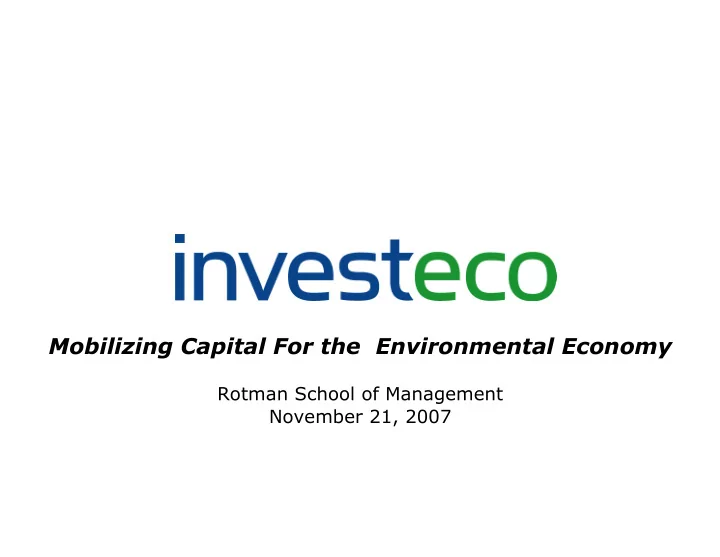

Mobilizing Capital For the Environmental Economy Rotman School of Management November 21, 2007
“We either don't see, don't experience, or choose to ignore the impacts our lives have.”
"We are drawing down resources that took millions of years to create in order to supplement current consumption."
Tragedy of the commons
Tragedy of the commons
Tragedy of the commons
Tragedy of the commons
Tragedy of the commons
“Each man is locked into a system that compels him to increase his herd without limit…in a world that is limited. Ruin is the destination toward which all men rush, each pursuing his own best interest in a society that believes in the freedom of the commons” Garrett Hardin, 1968
We need a shift in thinking Long Term Short Term We “ism” Me “ism” Savings/Investment Consumption Long-term Health Instant Gratification Low Operating - Higher Capital Low Capital - High Operating Education Entertainment
We need a shift in thinking Long Term Short Term We “ism” Me “ism” Leadership Savings/Investment Consumption Long-term Health Instant Gratification Low Operating - Higher Capital Low Capital - High Operating Education Entertainment Distributed and Collaborative Concentrated Elite
People will choose how far and how fast? Business Governments Capital Consumer Voter Investor
Policy - “What is the most critical issue facing the country?” Source: Globe and Mail, January 26
Canadians are ready to pay the price 91% of Canadians believe individuals will need to make changes in their lifestyle to reduce their production of climate changing gases 72% feel it will be necessary to increase the cost of the types of energy that contribute most to climate change. 80% favors raising taxes on these energy sources to discourage use if tax revenues would be devoted to promoting energy efficiency and developing alternative energy sources. 81% favor raising taxes on energy sources that cause climate change if other taxes would be reduced by the same amount so that their total taxes would remain the same. Source: GlobeScan Incorporated July 26th, 2007
Environmental Fiscal Reform “We need a predictable and consistent market that recognizes the true, full costs of doing business and reassigns them to the marketplace, where they belong.” • Tax Shifting • Cap and Trade Programs • www.sustainableprosperity.ca
Consumers: Expanding Consciousness “the cash register is the daily voting booth in democratic capitalism.” • Energy – Alternative energy, energy conservation – Reduction in high carbon products: packaging • Water – Water conservation • Food – Local – Healthy
“If not now, then when? And if not us, then who?”
Greg Payne Summary Environmental Economy Drivers Emerging Industries Investment Considerations
Three driving forces will create historic challenges and economic opportunities Environmental Resource Stresses Scarcity Demographics
Demographics Billions Source: UNEP
Globalization and Demographics: enormous environmental pressures Effect of equalization with developing world Good/Commodity Effect Cars 4x the number of cars on the road Meat 2.5x the total amount of meat consumed Energy 3x today’s amounts of energy consumed Source: WRI
Emissions Continue to Grow Stern Recommendation Source: EPA, New Scientist, IEA
Resource Scarcity - Peak Oil Source: UNEP
Crude Oil Source: Moore Research Centre
The Environmental Economy Pollution reduction and mitigation Renewable energy and resources Efficiency and conservation
Pollution Control and Mitigation $1.3 Trillion by 2030 Air pollution control – Coal scrubbers Pollution Control and Mitigation Market – Industrial emissions ($US billion) cleaning $1,400 Water treatment $1,200 – Municipal systems $1,000 – Industrial discharge $800 $600 Carbon control $400 – Carbon capture and sequestration (CCS) $200 – Carbon trading or carbon $0 tax Today 2030 Air Pollution Control Water Treatment Carbon Capture Sources: Government of Canada, Siemens Inc., IPCC, IEA
Renewable Energy $600 Billion by 2030 2% of global electricity today Renewable Energy Market – <1% of global energy ($US billion) $700 IEA expects 6% by 2030 $600 – New additions already more $500 than 10% $400 $300 Stern calls for 60% of $200 electricity carbon free by 2050 $100 $0 Wind competitive, solar costs Today 2030 falling Wind Solar Other Source: IEA, Solarbuzz, Vestas Wind
Efficiency and Conservation $600 Billion by 2030 Low-hanging fruit – High returns – Immediate results Utility metering and smart tariffs Building insulation, heating and cooling Auto fuel economy (hybrids) Recycling and waste-to-energy Grid and pipe upgrades Source: Itron, Badger, Wharton School, Waste-to-Energy.Net, Tomsa
Adding It Up A massive $2.5 trillion industry by 2030 Booz Allen: “Global Total Environmental Sectors Market infrastructure needs $40 ($US billion) trillion over 25 years” $3,000 $2,500 ASCE: “American infrastructure $1.6 trillion $2,000 over 5 years $1,500 $1,000 Cleantech Group: “Water $500 investment $20 trillion over 25 years” $0 Today 2030 Pollution Control Renewable Energy Efficiency and Conservation Source: IMF
Where Will We Get $2.5 trillion? In context – 5% of global GDP of nearly $50 trillion – 25% of global investment of $10 trillion Potential for investment to be diverted – Residential structures – Commercial structures – Transportation, infrastructure, technology
It’s time for an investment mentality Source: IMF
Energy Return on Energy Invested (EROEI) Source: ASPO, EROEI.com, The Oil Drum, Energy Bulletin.Net
Capital’s next home? Globalization Financial expansion Asset inflation 70s 80s 90s 00s 2010 Big Oil Japan Technology Environment BRIC -North Sea -LBO -Internet -Credit -Investeco sectors -Alaska -Real estate -Biotech -Housing -Gulf Tight commodity markets Rising inflation Excessive credit Large trade imbalances Shifting economic powers
“Anyone who thinks that infinite growth is possible in a finite universe is either a madman or an economist” Kenneth Boulding
Building companies that matter www.investeco.com
Recommend
More recommend